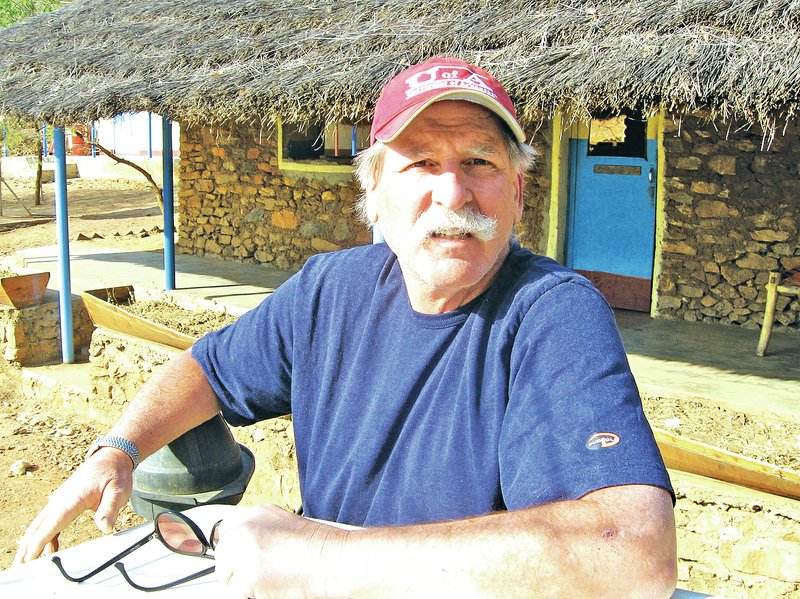We're all kin.
A wonderful evolutionary web, extending 6 million years into the past, connects humankind. The real Adam and Eve lived in trees in Africa and had a chimpanzeelike brain, but it survived and thus its genes inhabit our bones and brains to this day. Those genes urge us to care for ourselves, and there is evidence they urge us to care for our kin. Even if altruism weren't already an instinctive virtue, it's quite obvious rationally we cannot survive if we don't take care of each other. We frequently forget this, for example, when we regard people in far-off lands as "the other" and therefore ignorable. But they are us.
At A Glance
How You Can Help
Donations for the Nuba Mountains people can be made at www.omnicenter.org. Click the green “Donate” button on the top right. At the next page, click “Network for Good” to donate directly and securely, or click “Donate” to donate via PayPal. Designate your donation for “Nuba Mountains people.”
The Omni Center for Peace, Justice, and Ecology will host a Nuba Mountains fundraiser at 7 p.m. Sept. 6 at 3274 N. Lee Ave., Fayetteville, phone 935-4422. Sam Totten will give a brief presentation.
Unfortunately, we are not following the advice of our ancestors. If we were, we wouldn't, for example, be killing our own kin in the Nuba mountains in the southern part of Sudan.
The Nuba Mountains people, 52 tribes numbering some 1 million individuals, fought with other south Sudanese against the north in the Second Sudanese Civil War, a calamity that claimed 2 million lives and finally ended in 2005. The peace agreement allowed those in the south to hold a referendum to determine whether to remain with Sudan or to secede and form a new nation, the Republic of South Sudan. Ninety-nine percent voted to secede. However, the peace agreement didn't permit the Nuba Mountains people to vote or secede, leaving them under the dictatorship of the government of Sudan. That government has threatened to establish Islamic sharia law all across Sudan, which the Nuba -- a mixture of Christians, Muslims and animists -- want no part of. That, and ongoing oppression, racism (the Nuba people are mostly black) and disenfranchisement, resulted in the Nuba rebels returning to war against the government of Sudan in 2011.
Instead of solely attacking the rebels, the government carries out daily aerial bombings against civilians, targeting schools, churches, mosques, markets and farms. The bombs let loose razor-sharp shrapnel, often shearing off arms, legs and heads.
To escape, tens of thousands of Nuba have endured an arduous trek to the Yida refugee camp in South Sudan, but many have perished along the way, keeling over dead in their tracks. More and more people face starvation as their farms are bombed, forcing them into the surrounding mountains where there is no arable land.
The government of Sudan has established a no-fly zone over the mountains, preventing humanitarian organizations from parachuting in food, and has prevented the United Nations from delivering food in vehicles. Some assert this situation may be a replay of the genocide by attrition against the Nuba the government perpetrated in the early 1990s. Tellingly, Sudanese President Omar al Bashir is already under indictment by the International Criminal Court on charges of genocide, crimes against humanity, and war crimes for atrocities carried out in Darfur.
It happens that one Fayetteville citizen is making a positive difference in this disaster. Since January 2012, genocide scholar Sam Totten, along with six other concerned individuals, has been hauling as much food into the region as possible. You might have noticed his newspaper columns describing this work.
For the most part, they travel individually, accompanied by an interpreter and driver. With each trip, they deliver at least 10 tons of food to those in critical need. Sam purchases huge bags of sorghum, beans, salt and cooking oil in a market adjacent to the Yida camp and then heads north into the Nuba Mountains. It takes a week to wend his way over rutted dirt roads, the trip periodically interrupted by bombings. Sam sometimes makes two trips between Yida and the mountains. When Sam was last in the Nuba Mountains, large Antonov cargo planes carried out numerous bombings. He relates that on a recent trip he took refuge in an 8-foot-deep foxhole, from which he could extricate himself only by shimmying upward the way mountain climbers shimmy up crevasses, feet on one side and shoulders against the other side.
He is planning his next foray this December. My thoughts and good wishes will be with him.
Local groups, including the Episcopal Church, the Society of Friends (Quakers), the Omni Center for Peace, Justice and Ecology and several individuals have contributed financial assistance to this project. Some $10,000 for the purchase of food is needed for each trip into the mountains. You can help. Fayetteville has a unique humanitarian resource in Sam Totten. Help make this a Northwest Arkansas project, across the sea, human to human.
Commentary on 08/10/2014
